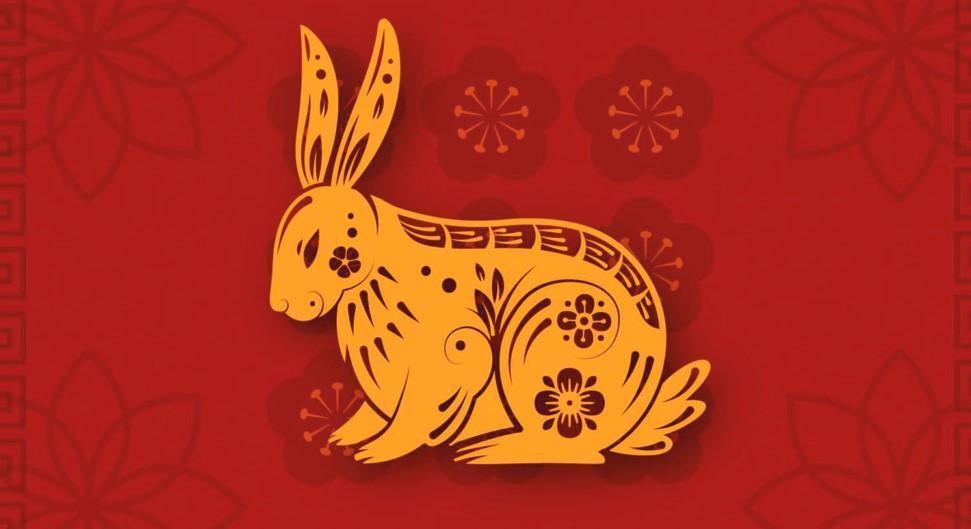
We entered the year 4721 on the Chinese calendar. Today is the second day of the year of the Water Rabbit. Like the ancient 12-animal Turkish calendar, the Chinese calendar is represented by 12 animals. The 12 animals symbolize both months and years respectively. This year is the year of the rabbit, the year of luck!
The peaceful, lovely rabbit is a symbol of reproduction and rebirth. The rabbit is a calm and peaceful animal. It does not harm anyone, hops up and down around, munching a leaf of lettuce or a carrot. Therefore, it is believed that the year of the rabbit will be a relatively calm and happy year for the world. Considering that the symbol of the previous year was the tiger, and the symbol of the next year is the dragon, the year of the rabbit will give the world an opportunity to breathe, and the world will be able to breathe a sigh of relief between these two predatory and wild periods. But the rabbit is unpredictable, it may get into unexpected trouble while hopping around in a daze, it may fall down a hole into dark worlds.
The rabbit is an animal that has a close relationship with the earth. As it wanders hopping around, it can easily disappear into the depths of the underground. That is why it is considered a bit mysterious. Its playful personality, its surprising behavior popping up here and there, has made the rabbit a centerpiece in many tales and stories. In Lewis Carroll’s “Alice in Wonderland,” the impatient and confused White Rabbit wearing a waistcoat, rushes around with a watch in hand. He utters constantly “Oh dear! Oh Dear! I shall be too late!” and though his destination is dubious, Alice follows him nevertheless and steps into a wonderland. The rabbit, the epitome of time passing, of hurry and worry, constantly reminds us of the passing life with the watch glued to its hand. In this subterranean world where night blends into day and everything is topsy-turvy, the bewildered rabbit is in an impossible chase of time.
Here in Türkiye, we have superstitions related to the rabbit. In Alevi-Bektashi culture, the rabbit is considered to have ties with the underworld, bringing news from the other side. In Anatolian folklore a rabbit or hare foot or tail, is considered as a lucky talisman. The rabbit creates a spiritual connection with the unknown, it is one of the animals accepted as Totems in the ancient Turkic culture. We see depictions of rabbits in Selçuk period tiles, the rabbit has been one of the foremost animals chased at the hunting games of Selçuk Sultans to the mighty Ottoman Süleyman the Magnificent. It was obviously one of the game meats offered in the feasts after the hunting parties, it was mentioned in Orhun Inscriptions, memorial inscriptions erected by Göktürks written in the Old Turkic alphabet in the early eighth century in the Orkhon Valley, modern-day Mongolia. Turkic prince Bilge Khagan says, “we ate deer, we ate rabbit” showing that rabbit was obviously eaten. Though rabbit meat is not a strong suit of Turkish cuisine, in regional cuisines, you may come across a few dishes. In Antalya, the recently published cookbook of the famed 7 Mehmet restaurant featured three rabbit dishes, a stew, a grilled special, and a fried rabbit roll, a kind of a savory börek. However, though the rabbit has a luck-bringing symbolism in Alevi-Bektashi culture, the Alevites are known for their detest of eating rabbit. A confused state of mind, just fit for the rabbit!
We hope the Year of the Rabbit brings us all good luck. But remember, the rabbit is an impetuous animal, as it hops around seemingly unoriented, it may get lost, or fall and disappear in the rabbit hole, and the time will fly by and without you realizing, the year will be over. So, make the most of your luck, next year is the year of the flaming dragon, you never know what comes next!
Chop Stick of the Week:
This week, of course it is not the fork of the week, but the chop stick of the week. Asian food is getting more and more popular in Türkiye, but it is not a very recent phenomenon, actually some of the renowned establishments have quite a bit of history in the country. SushiCo, one of the most established Asian and Chinese cuisine restaurants in Türkiye, is celebrating its 25th anniversary. Since 1997, SushiCo has been serving original dishes by Far Eastern and Chinese chefs and has 53 branches across the country also with branches in Cyprus, Kosovo, Macedonia and Albania. Interestingly, it is a Turkish initiative, and now celebrating their “quarter-of-a-century” they are planning to expand with new concepts. SushiCo ZEN, which is already opened in Ataşehir, Istanbul, is the first link of the new chain. Offering a more varied and richer menu and an additional range of Robata grill options in a quieter Zen-like environment just facing a green golf course, the place also aims to be a meeting focus as a social center. SushiCo branches will celebrate the Year of the Rabbit until the end of February, featuring lucky dishes on the menu such as longevity noodles, an array of dumplings, gyozas, and Korean wontons, steamed whole fish, and giving away free spring rolls with orders placed through the SushiCo app or website.